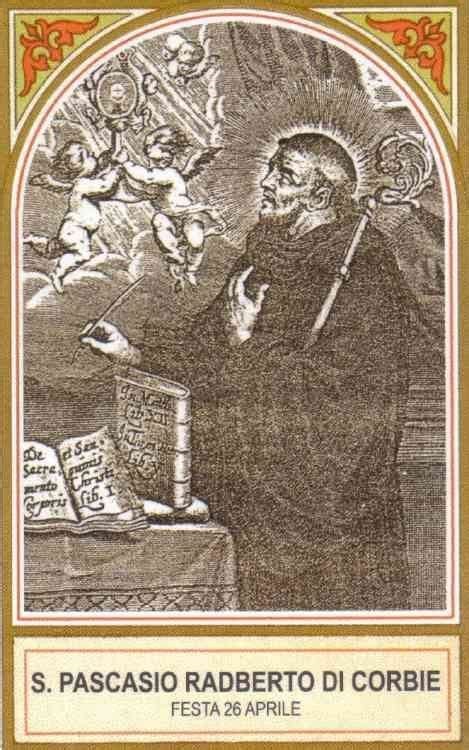Born in 785 and died in 865 he was a Carolingian Theologian, and the Abbot of Corbie, a monastery in Picardy founded around 660 by the queen regent Bathilde with a founding community of monks from Luxeuil Abbey. His most well-known and influential work is an exposition on the nature of the Eucharist written in 831, entitled De Corpore et Sanguine Domini (“The Lord’s Body and Blood”). He was canonized in 1073 by Pope Gregory VII.
Paschasius was an orphan left on the steps of the convent of Notre-Dame de Soissons. He was raised by the nuns there, and became very fond of the Abbess, Theodrara. At a fairly young age, Paschasius left the convent to serve as a monk under Abbot Adalard, at Corbie. There he also met Wala, Adalard’s brother and successor.
Through the Abbotship of both Adalard and Wala, Paschasius focused on the monastic life, spending his time studying and teaching. When Adalard died in 826, Paschasius helped ensure Wala would become Abbot in his place. Wala’s death in 836 brought yet another Abbot to Corbie, Ratramnus, who held opposing views to Paschasius on a number of ecclesiastical issues. Ratramnus wrote a refutation of Paschasius’ treatise on the Eucharist, De Corpore et Sanguine Domini, using the same title. By 844, Paschasius himself became Abbot; however he resigned his title ten years later to return to his studies. He left Corbie for the nearby monastery of St Riquier, where he lived in voluntary exile for some years. Why he resigned is unknown. It is likely,however, that his actions were motivated by factional disputes within his monastic community; misunderstandings between himself and the younger monks were likely factors in his decision. He returned to Corbie late in life, and resided in his old monastery until his death in 865.
Paschasius’ body was first buried at the Church of St John in Corbie. After numerous reported miracles, the Pope ordered his remains to be removed, and interred in the Church of St Peter, Corbie.


 Follow
Follow


